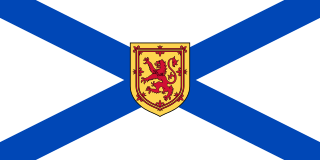The Progressive Party of Canada was a federal-level political party in Canada in the 1920s until 1930. It was linked with the provincial United Farmers parties in several provinces, and it spawned the Progressive Party of Saskatchewan, and the Progressive Party of Manitoba, which formed the government of that province. The Progressive Party was part of the farmers' political movement that included federal and provincial Progressive and United Farmers' parties.
The Nova Scotia New Democratic Party is a progressive, social-democratic provincial party in Nova Scotia, Canada. It is aligned with the federal New Democratic Party (NDP). It was founded as the Co-operative Commonwealth Federation (CCF) in 1932, and became the New Democratic Party in 1961. It became the governing party of Nova Scotia following the 2009 Nova Scotia election, winning 31 seats in the Legislature, under the leadership of Premier Darrell Dexter. It is the first New Democratic Party in Atlantic Canada to form a government. The party faced electoral defeat in the 2013 election, losing 24 seats, including Dexter's seat. The current leader is Halifax Chebucto MLA Gary Burrill, who is credited with bringing the party back to its left-wing roots, after the centrist policies enacted by Dexter. The party currently holds 7 seats in the Legislature, and had its lowest showing in the popular vote since 1993 during the 2017 Nova Scotia general election.
There have been various groups in Canada that have nominated candidates under the label Labour Party or Independent Labour Party or other variations from the 1870s until the 1960s. These were usually local or provincial groups using the Labour Party or Independent Labour Party name, backed by local Labour Councils or individual trade unions. There was an attempt to create a national Canadian Labour Party in the late 1910s and in the 1920s, but these were partly successful. The Communist Party of Canada, formed in 1921/22, fulfilled some of labour's political yearnings from coast to coast, and then the Co-operative Commonwealth Federation - Worker Farmer Socialist" was formed in 1932. With organic ties to the organized labour movement, this was a labour party by definition.
The Cape Breton Labour Party was a social democratic provincial political party in Nova Scotia, Canada, which drew most of its support from Cape Breton, the northern part of the Province of Nova Scotia.
Mark Eyking is a Canadian politician.

Cumberland—Colchester is a federal electoral district in Nova Scotia, Canada, that has been represented in the House of Commons of Canada since 2004.
David Morse is a Canadian politician in Nova Scotia. He represented the electoral district of Kings South in the Nova Scotia House of Assembly from 1999 to 2009 as a member of the Progressive Conservatives.
Marilyn More is a Canadian retired educator and politician from Nova Scotia.
This article provides a timeline of elections in Canada, including all the provincial, territorial and federal elections. The information starts from when each province was formed or entered the Confederation, and continues through to the present day.
The 26th Nova Scotia general election was held on 30 May 1967 to elect members of the 49th House of Assembly of the Province of Nova Scotia, Canada. It was won by the Progressive Conservative Party.
The 25th Nova Scotia general election was held on 8 October 1963 to elect members of the 48th House of Assembly of the Province of Nova Scotia, Canada. It was won by the Progressive Conservatives.
The 22nd Nova Scotia general election was held on 26 May 1953 to elect members of the 45th House of Assembly of the Province of Nova Scotia, Canada. It was won by the Liberal party.
The 21st Nova Scotia general election was held on 9 June 1949 to elect members of the 44th House of Assembly of the Province of Nova Scotia, Canada. It was won by the Liberal party.
The 19th Nova Scotia general election was held on 28 October 1941 to elect members of the 42nd House of Assembly of the Province of Nova Scotia, Canada. It was won by the Liberal party.
The 18th Nova Scotia general election was held on 20 June 1937 to elect members of the 41st House of Assembly of the Province of Nova Scotia, Canada. It was won by the Liberal party.
The 17th Nova Scotia general election was held on 22 August 1933 to elect members of the 40th House of Assembly of the Province of Nova Scotia, Canada. It was won by the Liberal party.
Nova Scotia is a parliamentary democracy. Its legislature consists of the Lieutenant Governor of Nova Scotia and fifty-one members representing their electoral districts in the Nova Scotia House of Assembly. As Canada's head of state, Queen Elizabeth II is the head of Nova Scotia's chief executive government. Her duties in Nova Scotia are carried out by the Lieutenant-Governor, Arthur LeBlanc. The government is headed by the Premier, Stephen McNeil, who took office October 22, 2013. Halifax is home to the House of Assembly and Lieutenant-Governor. The House of Assembly has met in Halifax at Province House since 1819.

The 2013 Nova Scotia general election, formally the 39th Nova Scotia general election, was held on October 8, 2013, to elect members to the Nova Scotia House of Assembly.



